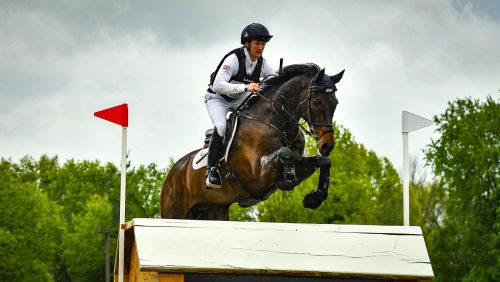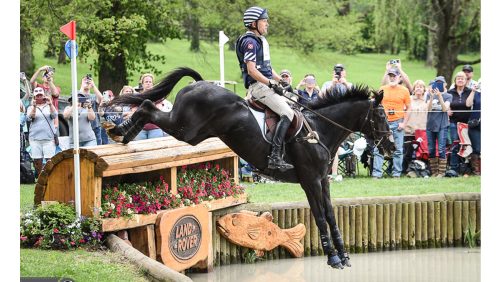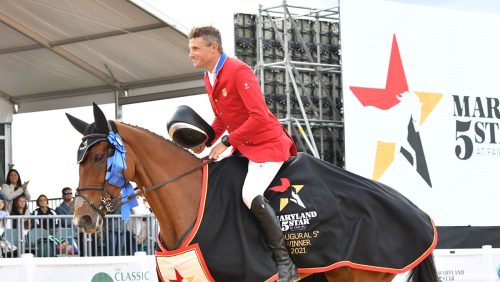Need to secure major sponsors and patrons for your horse trials? Seeking an energetic area chairman to rekindle flagging enthusiasm among New England eventers? Looking for charismatic leadership to run the 2003 U.S. Eventing Association annual meeting in Boston?
Just call on Louisa “Wezo” Pierson, the 57-years-young dynamo from Victor, N.Y. In the last few years, Pierson has answered these and countless other volunteer calls with her trademark aplomb, good humor and tenacity. She takes on a job like the event horses she loves so much–looking eagerly to the next challenge, galloping home well under the time.
Tim Murray certainly didn’t have time to co-chair last year’s USEA meeting. He’s a member of the USEA’s Board of Governors and competes in Area I events, plus he’s a husband and father of two teens while pursuing his career as a partner at a major Boston law firm. But when Wezo asked him to serve with her, he didn’t have a choice.
“Wezo just said, ‘Come on, Tim, I’ll grab this thing and run with it if you’ll just put the brakes on once in a while,’ ” said Murray, remembering how Pierson persuaded him to take the job. “Wezo is just so engaging, you end up wanting to be involved with whatever she’s luring you into. I don’t think anyone can say no to her.”
Refusing “no” as an answer signifies Pierson’s leadership style. “Besides being exceedingly well organized, Wezo is just so good on her feet,” said Kyra Stuart, who also lives in Victor and runs the Stuart Horse Trials, the event that spawned Pierson’s initial volunteer efforts into the sport.
“All Wezo has to do is talk to you for about five minutes, and you’re sold on whatever she’s pitching,” said Stuart. “She’s driven, but in such a nice way, and with such unlimited enthusiasm for the sport, that you can’t help but be drawn in.”
Eventing Beckons
Pierson grew up as Louisa Hunsicker in the horse-friendly enclave of Chestnut Hill, Pa., and rode as a child. Her grandfather, John Strawbridge, foxhunted and owned steeplechase horses, including Maryland Hunt Cup winner Coq Bruyere. But he never allowed Wezo to compete.
“My grandfather always felt that the horse show world was full of people a young girl shouldn’t associate with,” said Pierson with a laugh. “If he could only see me now!”
She put her horse bug on hold when she married Mitch Pierson and moved to the Rochester, N.Y., area. There she raised two boys, Trip (33) and Jake (31), and, after earning a graduate degree from the University of Rochester, she pursued a career in educational consulting. In 1990, she and Mitch gave in to their long-time urge to own a farm by purchasing property in Victor, adjacent to the land that would host the first Stuart Horse Trials that same year.
After watching that inaugural event, both Piersons–Wezo at 45, Mitch at 59–began taking riding lessons and quickly became addicted to foxhunting. Wezo’s first foray into eventing happened two years later, when some foxhunting friends convinced her to attend the Green Mountain Horse Association adult camp in Woodstock, Vt., in May 1993. But it wasn’t exactly a gentle introduction–her foxhunter whirled and spun at most of GMHA’s cross-country jumps.
“I would have packed it in for sure if [instructor] Michael Page hadn’t given me a private lesson at lunch time on the last day of camp,” she remembered. “He just worked us over crossrails and turned the entire disaster into a positive experience. If he hadn’t done that, I don’t think I’d be riding today. “He also gave me my first glimpse into the life of the eventing world–people just help you out when you’re in a pinch,” Pierson continued. “I began to realize what an incredible sport this was.”
A year later Pierson signed on with coach Heidi Stuart Vahue and rode in her first unrecognized event: “I remember thinking, ‘Come on, Heidi, can’t I just do the dressage part?’ “
But she carried on and won the event, despite walking on cross-country (there was no time limit) and surviving one stop in stadium. “Hey, I didn’t fall off,” Pierson remembered thinking.
Upon Vahue’s advice, Pierson searched for a more suitable mount and ended up with a draft-cross named Charlie. “He was dead honest, cute as could be, and totally restored my confidence,” said Pierson. The pair completed their first recognized event at Stuart in 1995.
ADVERTISEMENT
Cross-country time faults cost them a ribbon, but a bewildered Pierson housed several Stuart officials at her home that weekend. One of them was Roger Haller, who was at that time designing the cross-country course for the 1996 Olympics in Atlanta.
“What upset me was not knowing the rules and not bothering to ask about something I didn’t understand,” Pierson recalled. “Roger took the time to sit down, answer my questions, and explain the sport to me. What other sport is there, where you’re on the same turf with those at the Olympic level, and you’re all having fun and sharing a good time? People like Roger Haller and Michael Page will actually take the time to make your efforts out there as positive as possible.”
Pierson had such confidence in her mount, however, that she ignored the tell-tales signs of the horse’s tripping. “He even fell once while we were out walking,” she recalled.
In 1997, after two years of novice-level experience, the horse dropped a leg and flipped jumping a simple up-bank during a cross-country school. Pierson broke her neck and spent seven weeks in recovery.
“Fortunately I was knocked out in the fall and had no recollection of the entire episode,” said Pierson matter of factly. “I think the whole thing was harder for Mitch and the friends that saw the fall than it was for me.”
She was able to find a happy home for Charlie as a therapeutic riding horse. But she couldn’t seem to find a real successor to him, even as she began working with Carol Kozlowski after Vahue stopped teaching.
“Right from the beginning, I could tell that here was a rider who didn’t want to be carted around,” said Kozlowski. “She’s ridden a lot of difficult horses, and she’s worked hard for every success she’s had.”
Enter Nottingham
In the fall of 2000 Pierson learned that a 14-year-old Irish sport horse named Nottingham was for sale in Virginia.
“Notty’s owner, William Coleman [father of advanced rider Will Coleman], warned me the horse could be quirky–that I must never, ever put a chain on his nose,” Pierson recalled. “He bolts when you turn him out and won’t be caught unless he wants to come in. He can buck with the best of them too.”
But those quirks seemed minor for a rider with Pierson’s pluck. So she bought him and in 2001 launched their eventing partnership. She won her first novice event with Notty at Groton House (Mass.) that June, then moved him up to training level. At 54, this was Pierson’s first attempt at this level–and she won the B&B Horse Trials in nearby Rochester and placed eighth in the Area I Training Championships that fall.
“I had such a fantastic time riding Notty,” Pierson recalled. “He was so athletic and such a safe jumper that no fence ever looked big. He was also a showman and would do his very best in dressage. He was never quite as reliable in show jumping, but that only made me learn to ride better.”
But bad luck struck again when Pierson fell off her husband’s hunter that fall, landing her in bed for 11 weeks with a badly broken tibia and fibula.
“I didn’t know if I could walk again, let alone ride,” said Pierson of her ordeal. But Kozlowski had kept Notty in work, and she encouraged Pierson to event again. “Carol was so supportive–she never suggested I couldn’t do it.”
“The injuries are just part of life,” Pierson continued. “I’m certainly no great athlete. So I’ve learned to use positive visualization,to mentally get yourself into a place where you can focus and make the most of what you have.”
Pierson was back in the saddle the spring of 2002, winning training-level divisions at GMHA (Vt.) and Millbrook (N.Y.), where the pair won the perpetual trophy for the lowest overall score.
ADVERTISEMENT
Still, Pierson’s relationship with Notty was plagued by the horse’s frequent naughty episodes–like the time he dumped her at a Philip Dutton clinic and couldn’t be caught for 20 minutes in an enclosed arena. But these incidents only made her more determined to persevere.
“The bottom line is that she just loves the sport,” said Kozlowski. “She turns adversity into a learning experience. I can tell intellectually that she appreciates a challenge; she just doesn’t want to be carted around by some horse. She’s hit the deck more times than I can count, but she’s always one to jump up and say, ‘All right, I won’t make that mistake again.’ “
Nevertheless, even her determination can’t stop the clock, and Notty has grown old. After uncharacteristic, frequent stops this season, Pierson, upon Kozlowski’s advice, has decided to retire him. He’ll have a lifelong home with her, of course, and he’ll enjoy years in the hunting field.
“Every time I get to this part, the tears well up,” said Pierson. “Riding Notty was a special privilege, and I’m having a hard time giving him up. He will be hard to replace, but I’m not done yet.”
But she takes heart in remembering a recent GMHA horse trial, where she rode Notty into the arena to receive a blue ribbon. She looked around her and realized she was the youngest award winner; all the others in her training-level division were older than she.
“I can’t imagine ever not being part of the eventing world,” said Pierson, “whether it’s competing or volunteering or whatever. I’m hooked for life.”
Volunteer Extraordinaire
Wezo Pierson’s trademark never-say-die attitude quickly earned her a reputation as a fantastic volunteer. From 1993 on, Kyra Stuart tapped Pierson to oversee patron/sponsorship fundraising at her Stuart Horse Trials in their hometown of Victor, N.Y.
Pierson’s efforts drastically increased the competition’s revenues in these areas. And she convinced the people at Fiji Water–who had no previous connection to the horse trial–to donate 1,000 bottles of water, which volunteers hand to riders after they’ve finished cross-country.
When Pierson was laid up with a broken neck in 1997, Stuart talked her into taking the job of Area I chairman, a position she held through 2000. And then, while recovering from a broken leg in 2001, Stuart and Carol Kozlowski double-teamed to run the U.S. Eventing Association’s annual meeting in Boston.
“Every time I’m laid off, I guess someone figures I won’t ride again, so they nab me to volunteer,” Pierson quipped.
As area chairman, Pierson’s organizational skills enabled her to create the area council and to illicit help from countless Area I eventers. “I was smart enough to know what I didn’t know,” Pierson admitted. “So I would just call up various trainers and riders from the region, get their ideas and input, and then ask for their involvement in return.”
The resulting three years were among the most productive in Area I’s history. “I marveled at how Wezo ran the Area I meetings,” said Stuart. Through the area council, “she involved riders at all levels. Her enthusiasm for the sport is unlimited, and she’d just draw people in by going to competitions and getting to know everyone.”
“Wezo was a fabulous area chairman, ” said Kozlowski. “Even though a lot of people in the area didn’t know her when she took over, her clear insight and vision won people over immediately. Her leadership qualities are just so up-front.”
Pierson’s leadership at the 2003 USEA annual meeting contributed to record-setting attendance–720, a dramatic increase from the best-ever previous total of 487, set in 2002 in Cleveland–and brought many exciting ideas to that venue.
One of the most talked-about programs of the meeting was the forum on sports marketing, which Pierson conceived and orchestrated. She used connections and her famous persuasive ability to lure John Walsh, executive director of ESPN, and George Strawbridge, her cousin who’s the president of the National Steeplechase Association, to discuss how eventing enthusiasts could market their sport more effectively.














